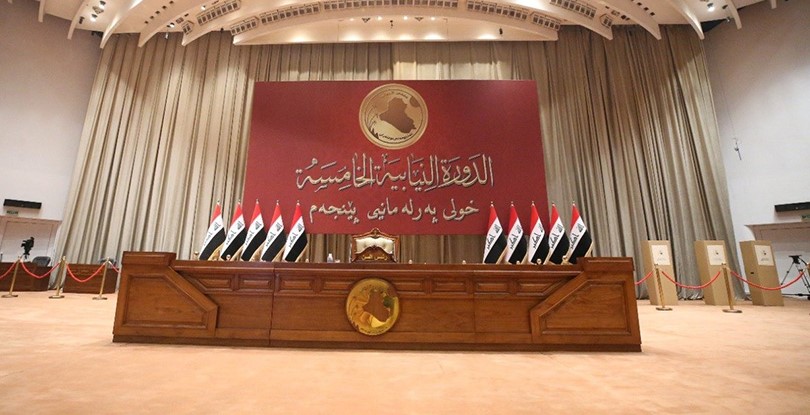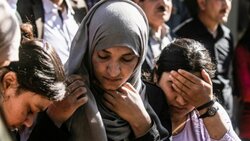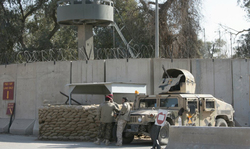Political turmoil in Iraq: struggle for Parliament Speaker position intensifies

Shafaq News/ In the intricate tapestry of Iraq's political landscape, a fierce battle unfolds for the pivotal role of Speaker of the Iraqi Parliament. As factions jostle for power and influence, the contest narrows down to key contenders, each representing divergent interests within the Sunni and Shiite blocs.
Against parliamentary disruptions, allegations, and strategic maneuvers, the nation braces for a critical session that could shape its political trajectory for years.
Key Players in Iraq's Political Dynamics
The Iraqi Parliament is comprised of 329 deputies representing various sects and governorates.
According to the High Electoral Commission, in the 2021 elections, the Taqadum Party, led by Mohammed al-Halbousi, secured 37 seats, making it the second-largest bloc after the Al-Sadr movement, which won 73 seats.
Notably, Al-Halbousi says that his Movement bloc comprises more than 40 members.
Al-Azm Movement, led by Khamees Al-Khanjar, gained 14 seats, while the National Resolve Movement (Hasm) obtained three seats.
In contrast, the Coordination Framework, representing Shia forces, holds approximately 129 seats in the Iraqi Parliament. The Framework includes the State of Law Alliance, led by Nouri al-Maliki with 33 seats, the Victory Alliance, led by Hadi Al-Ameri, with 17 seats, and the Al-Sadr movement's seats after Muqtada al-Sadr's withdrawal from the political process.
Additionally, Kurdish parties play a significant role in the Parliament. The Kurdistan Democratic Party, led by Masoud Barzani, holds 31 seats, while the Kurdistan Alliance, comprising the Patriotic Union of Kurdistan and Gorran Movement, has 17 seats.
The Largest Sunni Bloc
After approximately a month following the elections, a new Sunni alliance emerged in Baghdad under the leadership of Al-Khanjar, named "Al-Azm."
Comprising five political entities (Al-Azm Alliance, Al-Jamaheer Party Bloc, Hasm Movement for Reform, MPs from the National Accord Bloc, and the Arab Alliance in Kirkuk), the new Sunni alliance represents political blocs that participated in the elections across Al-Anbar, Saladin, Kirkuk, and Nineveh governorates.
In its formation statement, the alliance declared, "We have decided to establish a cohesive and robust political alliance of 34 members, with the potential for expansion."
In January 2022, a new alliance was formed, which included Al-Azm, headed by Al-Khanjar, and Taqadum, led by Al-Halbousi. With around 69 seats, this alliance is the largest Sunni bloc in Parliament.
Notably, this number is not official.
In 2023, a dispute arose between Al-Halbousi and Al-Khanjar, although both parties remained tight-lipped about the issue. Speculation suggests that the discord may be linked to the performance of Prime Minister Mohammed Shia Al-Sudani's government, according to some sources. Others indicate that the primary cause lies in the growing rapport between Al-Khanjar and Mishaan Al-Matar, a rival of Al-Halbousi.
What Happened?
On January 9, 2022, the newly elected Parliament held its first session and re-elected Mohammed Al-Halbousi as its Speaker.
On November 14, 2023, the Federal Supreme Court, the highest judicial authority in Iraq, decided to terminate al-Halbousi's membership. Then, on November 21, the Iraqi Parliament officially terminated his membership.
The decisions came after a lawsuit against him by Deputy Laith Al-Dulaimi. The lawsuit accused Al-Halbousi of forging Al-Dulaimi's resignation from Parliament membership, leading to the Federal Supreme Court's decision to end both memberships.
Al-Halbousi expressed his "surprise and disappointment" in a video statement following the ruling, "I am surprised by the issuance of these decisions. I am surprised by the lack of respect for the Constitution."
He emphasized that during his five years as Speaker, he operated with "integrity and never discriminated against Sunnis or Shiites."
The Forefront Candidates
Following the 2003 US-led invasion, Iraq follows the sectarian political settlements over the three presidencies (known as Muhasasa Ta'ifia in Arabic). Therefore, the parliament speaker is customary of Sunnis share.
The race for the next Speaker of the Iraqi Parliament is narrowing, with Salem Matar Al-Issawi and Mahmoud Al-Mashhadani emerging as the top contenders.
Al-Issawi, an Iraqi politician born in 1972, served as a member of Al-Anbar Governorate Council from 2010 to 2014 and has been a deputy in the Iraqi Parliament since 2014.
Al-Issawi is a member of the Sovereignty (Al-Siyada) Party under the leadership of Khamees al-Khanjar.
On the other hand, Al-Mashhadani, born in 1948, is an Iraqi politician and parliamentarian. He was the first Speaker of the Council of Representatives following Saddam Hussein's regime's downfall.
He has held various political positions, including heading the political bureau of the Islamic Dawa Party and serving as a founding member of the National Dialogue Council. He served as the Speaker from March 16, 2006, to December 23, 2008, and was also the President of the Arab Parliamentary Union in 2008.
No Elections, Just Disruptions
On January 13, 2024, the Iraqi Parliament held an extraordinary session to choose the new Speaker. The first round of voting ended with the victory of the Taqadum" party's Shaalan al-Karim with 152 votes out of 314. MP Salem Al-Issawi followed him with 97 votes, MP Mahmoud Al-Mashhadani with 48 votes, MP Amer Abduljabbar with six votes, and MP Talal Al-Zobaie with one vote.
However, due to verbal altercations inside the council hall, the session was adjourned without completing the election process, and no other session was held.
Since then, the political blocs have been unable to agree on a replacement for Al-Halbousi, with each side wanting to nominate someone from their group.
Waiting for Tomorrow's Session
The top candidates, Al-Issawi and Al-Mashhadani, will compete in an extraordinary parliamentary session on Wednesday.
Informed sources revealed to Shafaq News Agency a political agreement among parliamentary blocs to hold the session for the new Speaker's election.
The three Sunni blocs, Al-Siyada, Hasm, and Al-Azm, have nominated MP Al-Issawi for the position.
Azzam Al-Hamdani, a leader in the Azm Alliance, emphasized the importance of consensus and partnership, noting the Coordination Framework's positive approach to the issue to ensure the Speaker's position is filled.
While there is a strong consensus among Sunni and Shiite political forces on Al-Issawi's nomination, sources suggest the State of Law, led by Nouri Al-Maliki, may favor the other candidate, Mahmoud Al-Mashhadani.
The sources did not provide specific details about this matter, which could have sparked disputes within the Shiite bloc. However, other sources dismissed this hypothesis, confirming that the Framework forces will support Al-Issawi.
Sunni Blocs: No Agreements
Despite al-Halbousi's Taqadum Party insists on retaining the position because it holds the parliamentary majority within the Sunni component, his opponents from the Sovereignty (Al-Siyada), al-Azm, and Resolve (Hasm) blocs believe that the position is the right of the component without being bound by a specific political title.
Last April, the Taqadum party, led by al-Halbousi, warned that it would withdraw the party's representatives from both the government and the Parliament and Iraq's entire political process if the position of the Speaker of Parliament is granted to a candidate from outside the party.
Anwar al-Alwani, a prominent leader within the party, told Shafaq News Agency that the Taqadum party "holds reservations regarding any candidate from outside the party assuming the role of Parliament Speaker."
Al-Halbousi told the reporters on the sidelines of the ceremony marking the anniversary of the founding of the Asa'ib Ahl al-Haq movement in Baghdad, "We anticipate reaching a consensus on a candidate for parliament speaker and will be updating the internal regulations soon."
Asked about selecting a candidate for the position from outside Taqadum, al-Halbousi pointed out that his party holds a majority in Parliament and has "both political and electoral claims to the position."
In response, the CF Member MP Salem Al-Anbaki told Shafaq News that "the Framework's forces have rejected and continue to reject the amendment of the Parliament's internal system to reopen nominations for the presidency of the Parliament," considering that "contradicts the decisions of the Federal Court, and there is no justification for such a step, and such decisions cannot be made for the personal interests of some parties."
Al-Anbaki pointed out that two candidates from the Sunni component, Salem Al-Issawi and Mahmoud Al-Mashhadani, have now been nominated for parliament speaker.
"We believe that the matter is almost settled in favor of Al-Issawi, who will be elected in the next session of Parliament since there is parliamentary support for him from all blocs and parties."
In contrast, Al-Siyada, al-Azm, and Hasm have supported the Coordination Framework's call for the prompt election of a new parliament speaker within a week.
In a joint statement issued on Tuesday, these blocs urged the Parliament's presidium to swiftly schedule a vote, emphasizing the critical importance of this step for Iraq's political and institutional stability.
Describing the session to elect the Speaker as "crucial, necessary, and urgent," the Sunni signatories warned against further delays, citing potential disruptions to parliamentary work, risks to the country's interests, and threats to the democratic process.
They implored the Parliament's leadership not to postpone the session under any circumstances, pointing out the significant support with over 150 lawmakers backing the request for a speaker election session and the Parliament's prior vote in favor of such a session.
This statement follows recent remarks by the Shiite-led Coordination Framework, which placed responsibility for the vacant speaker position on Sunni groups. The Coordination Framework also expressed its intent to push for an extraordinary session to elect a speaker after a one-week deadline.





